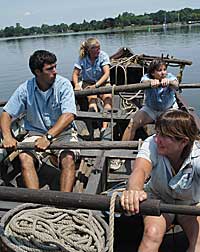  |
| HOME | THIS ISSUE | CALENDAR | GRANTS | BACK ISSUES | < BACK | NEXT > |
Maritime studies course offers academic, seafaring challengeby David Bauman - July 23, 2007 | ||||
| When Michael Bokoff applied to take a brand new maritime studies course at the Avery Point campus this spring, he wanted a real seafaring experience navigating the ocean. “I didn’t want to put into port every night,” says the 19-year-old sophomore from Norwich. Bokoff, a business major interested in the economic effects of maritime policy, was among 23 UConn students ranging in age from 18 to 38 years, selected to participate in the course, “Exploring the Blue.” Although he had little previous nautical training, Bokoff relished the experience, which included time onboard a two-masted sailing vessel. Recalling storm-tossed days and nights in rough North Atlantic weather, he says, “You don’t take this course for a ride; you’re part of the crew as well as a student. Physically hauling on lines soaked with cold rain while you’re literally being tossed in every direction at night – well, it takes its toll. But the course really challenged me to do new things.” The rigorous three-week, four-credit course was designed by two faculty based at the Avery Point campus: Helen Rozwadowski, associate professor of history and coordinator of maritime studies, and Mary K. Bercaw Edwards, associate professor of English, one of the country’s foremost Herman Melville scholars. Bercaw Edwards also serves as the foreman of the Mystic Seaport demonstration squad. Rather than drafting a science-based curriculum, as do most education-at-sea programs, they took a multidisciplinary approach that focused on maritime history, literature, and policy. The experiential aspects of the course – students participating in sailing and navigating the ship – complemented the academic component, giving students a comprehensive look at the oceans’ influence on people and human history. “Historians rarely study the ocean: they treat it as a place separate from people,” said Rozwadowski. “We treat the ocean not as a surface but as a three-dimensional place with political, economic, and environmental aspects, and also cultural and psychological dimensions – those qualities of ocean literature or the history of the sea that are absolutely critical for understanding the ocean as part of our world.” The course had two parts. The first week was spent on land participating in museum-based exercises and hands-on learning, such as climbing rigging, tying knots, and reading maritime charts, as well as attending lectures. Lecture topics ranged from literature of the sea to maritime law and the environmental history of the ocean. The students also took two day trips on Project Oceanology vessels. Rozwadowski says southeastern Connecticut is an ideal place to study connections between oceans and people. “UConn’s maritime studies program is able to tap into the resources of Mystic Seaport, Project Oceanology, and the U.S. Coast Guard Museum and Academy,” she says.
“We benefit from a group of marine scholars and experts that you can’t replicate anywhere in the country.” For the remaining two weeks, the class set sail on the SSV (Sailing School Vessel) Westward, a 125-foot staysail schooner owned by the non-profit organization Ocean Classroom, which provided a captain and eight crew members. This year’s cruise departed Baltimore, Md., on May 13 and sailed north to Nantucket and New Bedford, Mass., visiting a number of important maritime museums along the way. The Westward returned to New London on May 26, having completed a voyage of 1,165 nautical miles. For the voyage, the students were assigned to one of three watches. Each watch was responsible for steering, keeping a lookout, setting and furling the ship’s nine sails, and practicing navigation. UConn faculty taught shipboard classes on topics including the Chesapeake Bay oyster wars, dictatorship as the necessary form of leadership at sea, and the history of fisheries and whaling. “It’s not a pleasure cruise,” says Bercaw Edwards. “In addition to standing watch, students had required reading for every class, and most class meetings included academic assignments and discussion. “Going to sea is always a personal growth experience, but we designed this program to be academically rigorous,” she adds. Students had to keep logbooks, write analytical pieces after each museum visit, and research the origin of a maritime term. After the voyage, there were several writing and research assignments. One priority in designing this program was to make going to sea both affordable and accessible in terms of timing. Rozwadowski says the maritime studies program received support that helped create an affordable program. “That speaks to the opportunities UConn makes possible for a well-rounded educational experience,” she says. |
| ADVANCE HOME UCONN HOME |

